[Newspaper]
Publication: The Muncie Morning News
Muncie, IN, United States
vol. 22, no. 63, p. 1,5,8, col. 2-5,2-5,1-6
FLINT BOYS WORK WONDERS
Give Muncie Unionism a Boost That Will Not Be Forgotten For Many
Years to Come.
OPENING DAY OF THE 22ND ANNUAL CONVENTION
Marked With a Great Demonstration Followed by Addresses From Gifted Orators — Hundreds
of Toilers Brave the Torrid Heat On Pavements — Out of Town Guests Not
Numerous But the Whole Affair Was None the Less a Grand Success.
Old Sol appeared bright and early as usual yesterday moring [sic] morning and all day did his part most admirably in brightening up the atmospheric conditions to make the first day's session of the Flint Glass Workers meeting all that could be hoped for. It was warm, but there have been a great many previous July days that were much warmer, and the general conditions were cause for happiness on all sides.
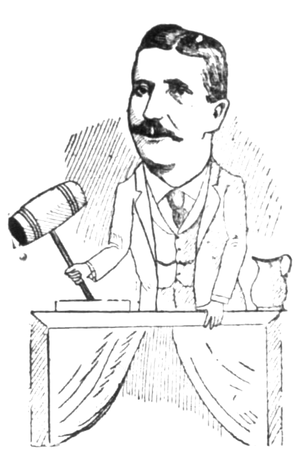 |
PRESIDENT W. J. SMITH.
Early in the day it became known that President Gompers would not be able to come on the opening day to participate in the big demonstration, and Governor Mount had official duties that prevented his presence in Muncie, these things, coupled with the receipt of a telegram from "Golden Rule" to the effect that he had missed connections at Sidney, Ohio, and could not arrive in Muncie till 8:40 last night, caused some disappointment, but to the casual onlooker these alterations were not noticeable, and a happier time was never enjoyed than by the participants in the festivities generally.
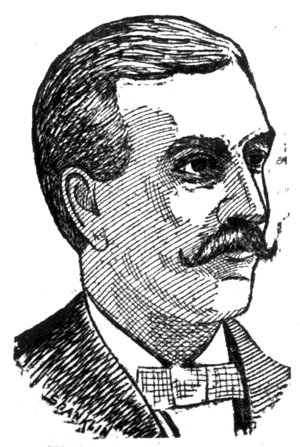 |
GOLDEN RULE JONES.
Yesterday was the time set for the organization of the state board of tax equalizers and the governor is chairman of the board and it is absolutely his duty to organize it. This prevented his possible departure until after dinner, and
AN ATTEMPT WAS MADE
To get him here on the Lake Erie at 4 o’clock, but this train out of Indianapolis could not be secured either, and his great desire to participate in the demonstration went for naught.
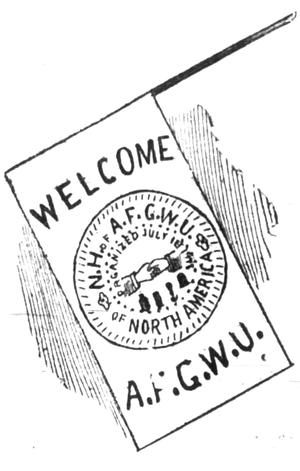 |
Judge Tarvin, of Kentucky, the man being talked about as a possible candidate for the vice-presidency on the National Democratic ticket, arrived, but his coming was late, so much so that the movement of the parade was slightly delayed, to enable him to ride in the procession to Heekin Park where he was booked for an address. Mayor Jones, of Toledo, another lawyer who is being looked forward to as possible timber for the head of the National Democratic ticket, came and filled his engagement, but did not arrive until after the close of the afternoon proceedings, and he made his address last night on the east side of the court house.
President Smith and other National officers came Sunday, with the delegates who had not arrived previously, and at noon yesterday there was not a delegate missing, all here ready for the business they were elected to take care of.
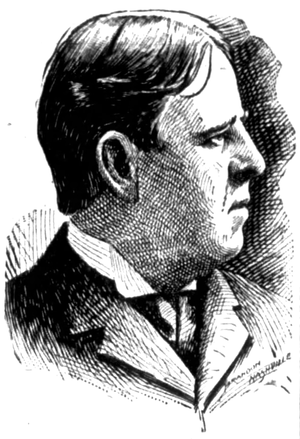 |
JUDGE JAMES P. TARVIN.
President Smith informed the delegates that they should meet in the convention hall yesterday morning at 10 o'clock for the purpose of turning in their credentials to the credential committee for examination, this to be done by the noon hour. The meeting was called to order by the president, and in behalf of the local
FLINT GLASS WORKERS
State Senator Ball made a short welcome address which was responded to by President Smith and the following committee on credentials was appointed:
Henry Schohe, Pittsburg, chairman.
W. Wassemyer, Wheeling, W. Va.
William Floto, Muncie.
James Wheeler, Pittsburg.
Jacob Hoffman, Pittsburg.
Patrick Murray, Marion.
Owen Conners, Stubenville [sic] Stuebenville, Ohio.
John McCullough, Stubenville [sic] Stuebenville.
Joseph Campbell, Montreal, Canada.
Samuel Cossaboon, Milville [sic] Millville, N. J.
Perry Hardin, Philadelphia.
S. L. Hormann, Philadelphia.
Fred Gass, Muncie.
D. H. Glunt, Charleroi, Pa.
Nick Maner, Pittsburg.
James Jones, Pendleton, Ind.
William Curren, Jeanette, Pa.
Jacob Taylor No. 63.
Peter Schaaf, Jeanette, Pa.
Adam Chettle, Elwood.
J. A. Johnson, Monaca, Pa.
George Demuth, Alton, Ill.
William E. Mitchell, Charleroi, Pa.
Frank L. Smith, Pittsburg.
Eugene Hand, Milville [sic] Millville, N. J.
Fred Harpfer, Wheeling, W. Va.
The committee was closeted at 11 o'clock and did not report for more than an hour afterwards, during which time a recess was taken in the convention and a happy hour of social intercourse was enjoyed by the delegates. During this time the delegates and officers generally evaded discussing business matters, feeling that there is plenty of time to do this work, and the time was spent socially, the delegates making frequent visits to the barrel of ice water in the hall.
SARAH A. CROSSFIELD.
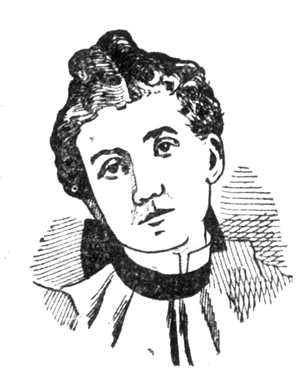 |
National Organizer of the Union Label League.
The noon hour had arrived when the committee reported that it had completed its work, and without hearing the report. President Smith adjourned the meeting until 8 o'clock sharp this morning, when the first real business session will he held.
The several committees will be appointed and work generally taken up to be discussed and settled during the coming ten days.
THE PARADE
A Grand Success and Was Witnessed By
Thousands.
The parade moved an hour late, an a result of the principal speaker of the day arriving on the late train at 1 o'clock, the start being made at 2:15 sharp from the southwest corner of the public square.
The line of march and column were both changed to best fit the occasion, and the column, nearly a mile long, moved south on High street to Dumont, thence east to Walnut, north to Main, east to Hackley, south to Willard, east to Grant, then south to Heekin park, where the orators of the day held forth.
President Orebaugh, of the Muncie Trades Council was Grand Marshal of the day, and moved the column perfectly, the thousands of wage earners never showing up to better advantage, braving the excessive heat most admirably. There were a few who fell out while treading on the hot pavements, but the column never faltered and marched the entire distance.
There was some disappointment that there were not more representatives of the several unions represented, but in most cases there were excuses, and under the circumstances the representation of the city was more than fair. The outside towns did not add many to the number in the line, Marion alone contributing a dozen members of the Green Glass Pressers’' league. Elwood could get no train home last night, and the expected throng from that town and intermediate towns did not come.
The carriages were handsomely decorated. the members of the Union Label League riding in wagonettes. Music was furnished by the Indiana and Red Men's bands, the City band not turning out The parade was composed of the following organizations:
Platoon of Police.
Twenty-four Flint Glass Workers, composing the Reception Committee, from the three locals.
The Indiana Iron Works’ Band.
Police Commissioners, Dr. Frank Jackson, Victor Silverburg and C. R. Heath, accompanied by Superintendent Cashmore, in a carriage.
Messrs. Crabbs, Anthony, Gill, Hutchings and Budd, of the City Council, in a carriage.
Mrs. Lillibridge and Mrs. Crossfield, National officers of the Union Label League, in a carriage.
Frank and George Ball, glass manufacturers; Chairman Charles Edmonds and J. J. Fitzgibbon, in a carriage.
President Smith, Secretary Kuntzler, Assistant Secretary Claire and National Organizer Rowe, in a carriage.
Anna Coakley, Addie Gaughan, of Muncie, and Mrs. J. George, of Steubenville, O.; Martin Houlihan, of Steubenville, and Easter Wilcox.
Mrs. M. Keifer, Mrs. G. Humphreyville, Mrs. George Spence, Nellie Koontz and James Quinn, of Steubenville, in a carriage.
Judge Tarvin, Ralph Hemingray, Charles Boldt and Isaac Humphries, the three latter Muncie glass manufacturers, in a carriage.
Congressman-elect Cromer. Judge Leffler and State Senator Walter L. Ball, in a carriage.
MRS. BELLE J. GRANT.
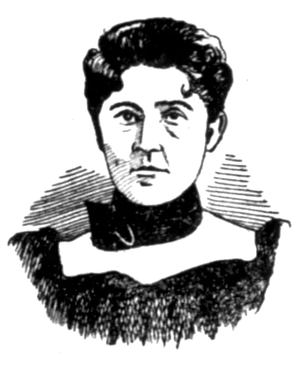 |
International Secretary and Treasurer of the Union Label League.
Following these decorated carriages came lady members of the Union Label League in wagonettes. Their names follow:
Mrs. Edward Seldomridge.
Mrs. William Finley.
Mrs. M. Wilson.
Mrs. Minnie MacDowell.
Mrs. B. J. Grant.
Mrs. Lon Schwennesen.
Mrs. C. H. McDonald.
Mrs. Josie Humphries.
Mrs. M. L. Strang.
Mrs. John Reese.
Mrs. Dan Donnelly.
Mrs. C. Brown.
Mrs. William King.
Mrs. J. Roesler.
Mrs. Peter Garlach.
Mrs. John Hagenlocker.
Mrs. Julia McCarty.
Mrs. Emma McFarland.
Mrs. Lillie Pippen.
Mrs. Mary Kettlewood.
Mrs. Maria Wasson.
Mrs. Jacob Stopper.
Mrs. Lizzie Floyd.
Mrs. W. A. Fansler.
Mrs. J. H. Routh.
Mrs. J. H. Myers.
Mrs. B. F. Orr.
Mrs. M. E. Pence.
Mrs. A. A. Spangler.
Mrs. L. A. Liville.
Mrs. C. F. Hubbard.
Mrs. S. Robinson.
Mrs. Emma Eich.
Mrs. Lucy Waldo.
Mrs. C. N. Edmonds.
Mrs. Etta Coe.
Mrs. M. J. Copper.
Mrs. Edward Pence.
Mrs. Willard Briggs.
Mrs. E. A. Dewitt.
Mrs. J. Sullivan.
Mrs. T. J. McElherron.
The next carriage was occupied by George Durst, George Pancoast, Thomas Powers, T. J. King and R. W. Archer. James Maliff, John Fody and two little girls came next in a carriage.
Next in line was the Red Men's band, followed by 147 of the 204 delegates to the convention.
Thirty employes of the street car company came next, followed by twelve representatives from the local Typographical Union, of whom seven were employes of The Morning News, two the Central Printing Co., one from the Besack Printing Co., and two unemployed.
The American Agent's Association came next, with fifteen men in line.
ELLEN LILLIBRIDGE.
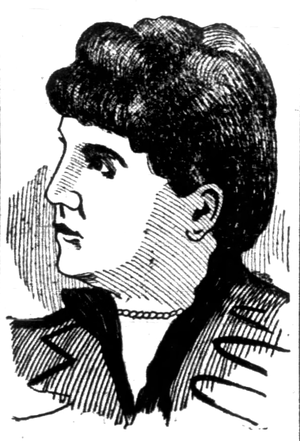 |
Vice President Muncie Trades Council and President International Union Label League.
There were sixteen members of Local No. 65, of the Painters' and Decorators' Union of Muncie.
The Plasterers' Union was represented by ten men uniformly dressed, with ten representatives of the Barbers' Union following them.
The next marchers were fifty-seven members of Local No. 1 Green Glass Pressers' League with twelve Marion men from Local No. 2.
Local No. 2. of the Flint Glass workers, had forty-nine in line. No. 91 had forty-six men in line, and No. 23 was represented by sixty-eight men.
These wound up the parade, each carrying its handsome banners.
During the entire line of march there were throngs of people along the streets and those in line were cheered many times, the women coming in for particular notice, of course.
AT HEEKIN PARK
Some Notable Appeals Made For the
Cause of Unionism.
Judge Leffler was chairman of the meeting and in assuming the chairmanship said that he was proud to be the chairman of this occasion and then introduced Mr. Tuhey the mayor of our city who delivered the welcome address.
Mayor Tuhey in a short speech with well chosen words welcomed to our city and our homes the delegates to the National convention of the American Flint Glass Workers' Union and all strangers within our gates. He was applauded as he retired to his home and room where he was confined all day yesterday quite sick, and his presence at the meeting was a great effort.
PRESIDENT SMITH
Gives Interesting Talk On Labor Saving
Machinery.
President Smith, after a few introductory remarks, said:
"The application of labor-saving machinery as a means of production has had a tendency to cut wages and to destroy the opportunities of the common people. It now requires an amount of capital to operate a plant that the ordinary worker can not expert to accumulate in his life time Thus he is not allowed to compete with his more fortunate capitalistic brothers, who handicap him in the race.
MAYOR EDWARD TUHEY,
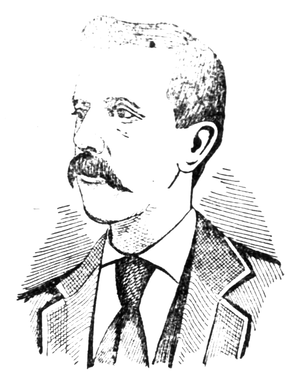 |
WHO GAVE THEM THE KEYS.
"The formation of trusts has a decided tendency to monopolization. This operates to cut wages, raise prices of food and living and to abridge the freedom of the workingmen. It also tends to destroy the opportunities of the laborer and his family.
"This condition is not a local one, with which a single union is brought into contact, but its field is international. As flint glass workers we are confronted by the same conditions that prevail in other branches of the industrial world.
"As a remedy — but not as a cure — to the condition, the laboring men have their eight-hour day, their scale of wages and their co-operation. As to these means, I am perfectly clear, but there is much doubt as to their application, and this can only be solved by continued effort and united strength of the laborers throughout the country.
"I do believe that one of the strongest and mightiest weapons against the evils of our present time and the tenderer of the day, is the mighty army of organized laborers. As flint glass workers we are taking up the fight, and side by side with our brothers we will continue the work until victory is ours."
President Smith is a logical thinker and a pleasing speaker. His remarks were frequently interrupted by applause, which showed the hearty approval of his hearers. President Smith is very popular with his fellow workers, having been President of the flints since 1886. He was one of the men connected with the founding of the organization in 1878, and has taken an active interest in it ever since.
SENATOR BALL'S
Hearty Welcome to the Flint Glass
Workersr [sic] Workers
"I desire to congratulate you as an organization for this splendid and matchless demonstration. It is an evidence of harmony and unity within your ranks, and I desire to compliment organized labor generally for the splendid manner in which it has assisted in making this meeting and convention an overflowing success. The city of Muncie is proud of her great army of workingmen, and they in turn are proud of their city.
"Upon labor depends the future greatness of all our cities, and the welfare of the great mass of our people. If the world's material
advancement is so dependent upon labor, then to be advanced rapidly labor must wait upon itself, and the only way for labor to wait upon itself is to organize and protect itself.
"Labor organizations or trades unions have existed in some form or other almost from time immemorial. In mediaeval times little was written or spoken on the subject, but the tendency of modern legislation, especially in the United States, is in favor of the advancement of the interests of the great working masses. Now and then we find or hear of some judicial puppet who hasn't sense enough to do anything except to listen to the jingle of the guinea, decide that a great body of men have not the right to quit the employment of another and solicit their brethren to do likewise, and urge and insist upon unionizing the institution they left and entreating others not to enter the employment unless their demands are complied with.
What do you organize for? For the purpose of securing the most favorable conditions as regard wages and hours of work, and regulating generally the relation between employer and employe.
"You have the right to insist that the price shall be justly fixed between your people and the manufacturers, and to do everything within your power, exhausting all peaceable and lawful means to get your price. You have the right, and I beseech you, my friends, that it is your duty, to go to your brother as he sits by his fireside or as he goes to work, and ask him not to work for less than the standard of wages fixed by your organization. You have the right, and should, if you fail with him, to sit down in his quiet home, where wife and children are, and tell him of the blessings of unionism, teach him of the brotherhood therein known, tell him of its future hopes and its shining past, and out of the tears of servility and oppression you will see him feed upon it. His children's tears will be wiped away and the blush of plenty will return to the mother's face.
"To all of those in union places, you should go to them, tell them that they brothers and that they must help you support the civic wreath of home; tell them that since capital, with its greedy clutches, by its illegal fountains, has restricted the hours of labor by the method of industrial imperialism. Labor by organization must protect itself against the onslaught of this enemy of the republic. Tell him that labor is dignified, that it has been given the divine blessing, and that man, finite as he is, should never cease to know it; tell him that he is entitled to his free and unfettered discretion as to whom he shall work for and as to how much he shall receive, and that the brand of servility shall be taken off his contract, and, last of all, tell him that labor — "O, beautiful word" — everywhere must stand together for the advancement of citizenship, for the right of equal opportunity, and the distribution of love and comfort in the home. (Applause.)
"More than this, you have the right to go to all your friends and make known to them the wrong that has been done you, and say to them, each of them; 'if you are a friend of labor withdraw your patronage from the man who injures us or refuses us justice.' In other words, argument, reason and entreaty are lawful weapons, and up to this point public opinion says: 'Heaven speed you!'
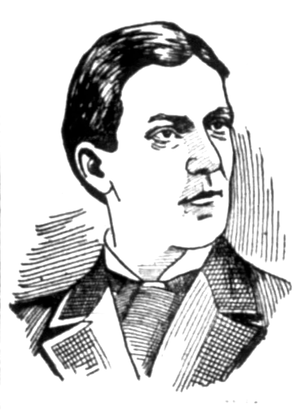 |
WALTER L. BALL.
"My fellow-citizens, it is your duty, in order that you may properly protect yourselves from the approaching hurricane of combines, or what is more frequently styled by the euphonic name of 'trusts,' to form more and stronger unions.
"The union is a magnificent investment, and is a splendid weapon for labor to fight the trust with. In some states capital has secured indictments against the unions upon the assumption that an anti-trust law aimed as much at the union as the combine, but this kind of a prosecution at the instigation of a trust, is a recognition on their part that a good, healthy, strong labor organization is their most formidable foe.
"But what a vast difference there is between a labor organization and a trust. A trust is an institution organized for aggression, and a labor organization is formed for the purpose of protection and defense, for the purpose of keeping up the price of labor, for the purpose of increasing the production and they themselves to increase the consumption. The one increases the hum of the busy wheels, brings new activity into the ramifications of the business itself, lights up the community with the smiles of plenty, and concludes the entertainment by making good homes, which is the mainstay of our government. The purpose of the other is to batter down wages, curtail the force that is to do the work, restrict the time in which it is to be done, reduce the price of raw material, increase the price of the finished product, be both buyer and seller, and do all things necessary to make themselves money, and nothing to make any one else anything; one destroys identity and individuality by sopping up the people and little concerns as though both were tired of life and the other broadens the field of competition and uses the whole of nature for a market. The decree of one is to narrow the field of operations by putting all like businesses into one huge combination, thereby controlling the product and the men who make it and placing at the door of every consumer the sign. 'Dig up; you are at our mercy!' But the other desires an honest living and a chance to earn it in a field of equal opportunities with equality for all and exactions for none.
"Every time you concentrate business, every time you allow one mammoth corporation or partnership to swallow up others that are producing the same article, you restrain trade and stunt the genius of the best American brain. To restrain trade is not only a public calamity, but restricts the party in his industry; not only that, but you hurt the party by precluding him from pursuing his occupation, thereby preventing him from supporting himself and his family.
"And, my friends, I am opposed to trusts because they drive out home competition and swallow up all the natural laws of trade and commerce, and have us at the mercy and machinations of a machine, and not in the open air with the individual; and I believe a good way to fight them is with the union.
"A trust that is making the finished product must have skilled labor, and a skilled laborer is always to be found in the union. Get them all there; leave no one out. Let the unions continue to organize and let them aid the authorities in prosecuting trusts to extermination. Let them do it without fear, favor or hesitation, for a just judge or a sensible jury will never decide that a labor union is a trust.
"But here let me say that we entertain no hatred against the rich. There is no rankling in my breast or none in the bosom of the great masses of laborers, against the rich. You, I am sure, welcome in your midst the rich and poor alike. The man that succeeds well deserves the praise and commendation of his friends, and in this land no one is more willing to extend the hand with more profound thanks than the man whose cheeks receive the countless drops of sweat while in honest toil. All that we ask and all that it is right to ask is that both be treated with even justice and stand equal before the law.
GRAND MARSHAL OREBAUGH.
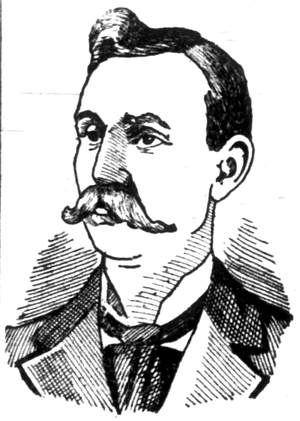 |
President of the Muncie Trades Council.
But we do assert that because a man is rich, or because great combines with inestimable resources are here, they have no right to think for us or for the many, neither have they the right to write our laws or sit upon the consciences of our legislators while in the halls of parliament.
"This is a great year and we are a great people — matchless in resources, broad as the air in genuine and human industries, respected at home and recognised abroad, with all lines of sectionalism forever obliterated, with more patriotism and invincible courage than any people in any clime in all the world.
"With all these divine and material blessings we shall and must go on with a firm and determined purpose to fraternize the world of labor into one grand and triumphant union."
MRS. SARAH CROSSFIELD
Eloquently Explains Union Label League
and Is Cheered.
Mrs. Sarah Crossfield, national organizer of the Woman s Union Label League, spoke in a very pleasing manner and was well received by the audience. In part she said:
"The union label stands for something. It stands for good condition of union labor and for superior workmanship. It is the protection of the union laborer, as it distinguishes his goods from the product of scab shops. Few people know the extent of the use of these labels. Over 30,000,000 have been used by the hat makers and many millions more by the union cigar makers. Everywhere the label is gaining ground. But it has not reached the greatest efficiency yet.
"The reason for this is apparent. The women of the family are the greatest purchasers. To them is intrusted [sic] entrusted the money which the husband makes. Until recently no organized effort has made to make the women recognize the value of purchasing union goods. We are trying to do this and we believe that the success of the label depends on our efforts. We are rapidly spreading our local branches and by another year or two the union label will be on every article purchased by the housewives of a hundred thousand union homes in our land."
CONGRESSMAN CROMER
Muncie's Ex-Mayor, Delivers an Eloquent
Address.
“This magnificent demonstration, the grand parade in which you have just taken part, the coming together of these delegates of one of the strongest labor unions of this country, in national convention, have the same purpose and object in view. Today we all unite in the same sentiment for the glorification of labor.
“My friends, the work in which you are enlisted, is the most important which engages the minds of men at the present time. You are engaged in an effort to better your own condition; in an effort to better the condition of the men who have developed the resources of this country, who have forced the mountains and hills to surrender their hidden wealth, have felled the forests, cultivated the fields, built our homes, reared our cities, created the comforts and pleasures of life — in truth, have carved an empire out of this continent.
“The labor unions of this country are building a new civilization, in which love and justice and the proper regard for the rights of others prevail, in which the Golden Rule is made the guide for the conduct of men. In this new civilization the interests of men are closely related and no man is independent but each man is dependent upon every other, and all our interdependent. The principle of competition is displaced by the higher and nobler principle, cooperation.
“You, my friends, are engaged in the work of emancipation. You are endeavoring to set men free. You are not engaged in a struggle for religious liberty, nor, political independence, from the War of the Revolution our forefathers at Concord and Lexington and Bunker Hill, at Valley Forge and at Yorktown, secured religious liberty and achieved political independence from England. Your struggle is not against chattel slavery, for Abraham Lincoln, the immortal, wiped out chattel slavery by his emancipation proclamation. But you are engaged in a struggle for industrial freedom.
"There is a wage slavery in this country that you must eradicate. The task master that lashes the toilers to work has not flesh and bones, but is more arrogant than many in human form. The task master I refer to is the stern cruelty of working incessantly, during the long hours of each day, to earn a scant living for self, wife and little ones at home. The struggle in which you are engaged is to get a fair share of the comforts and necessaries of life which you yourselves create and produce.
"You are entitled to have your children educated in the best schools and colleges of this country, and cultured and trained in music and art. Your homes should be comfortable, pleasant and attractive. Nature inspires you to make your home charming and beautiful, Everywhere nature has carpeted the fields and forests with grass of velvet green, and bedecked and adorned this carpet with little daisies and all sorts of other flowers and the birds sing their inspiring songs for your entertainment.
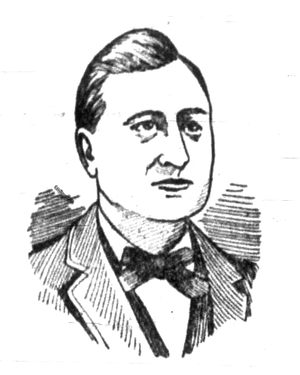 |
CONGRESSMAN-ELECT CROMER.
"To enjoy the comforts and pleasures of home, your hours of toil must be shortened, and the reward for your labor must be increased. Too much time has been given by those who labor, to provide the wants for the body, and too little time has been afforded them to cultivate their minds and hearts. The most important part of man is his mind and he should have ample time to cultivate it.
"Without the cultivation of the mind and the pleasures of home, life is monotonous, and not enjoyable. Your work has a great deal of the sameness about it: day in and day out you are engaged in blowing glass, in making the same kind of ware, without the hope of winning the applause of the people. Not so with those who follow other callings and professions. When the painter touches his brush to the canvass in delineating the character of some important personage, and when he traces the landscape or some beautiful scenery in nature, be it inspired by the hope that he will receive the plaudits of the people, by the hope that his work will be admired by thousands of the lovers of art. The lawyer, when he advocates the cause of his client before the court and jury, as he pours forth his strains of eloquence in an effort to preserve the life or liberty of the man he defends, is inspired by the consciousness that he is achieving success and renown. The statesman, when he frames laws and secures their enactment, hopes to win the good opinion of his constituents.
"You, my friends, are the stay of our Republic. You fight the battles for the people in time of war, and create their pleasures and comforts in time of peace. In every war fought by our government from field and heated factory, from in front of the blazing furnace and the fiery forge, have come brave men, with stout hearts, who have defended our starry banner and preserved the liberty of the people.
"You are entitled to the very best the world can afford. In order to get it you must perfect your organization and have unity of purpose and action. Your demands are reasonable and just. There was a time when your organizations were looked-upon as so many conspiracies, instituted for the purpose of robbing employers of their rights, but your conduct has been so reasonable and commendable that you have won the respect of the whole people. You have not asked for charity, but have demanded your rights. You have not sought aims from the people, but have demanded employment at fair and reasonable wages.
"You have accomplished much, but much more remains to be done. You must so perfect and strengthen your organization until the good of one will be the good of all. and the injury or each shall be the concern of all. The idea that each shall mind his own business has no place in labor organizations, and is the doctrine of a selfish mind. But the welfare and good of all should be the business of each, which is the gospel taught by that great Teacher of men as he went up and down the hills of Judea, teaching the people, and is the doctrine of the true brotherhood of man.
"Continue your organization and education until you have obtained such industrial conditions that you may become a little wiser, a little more hopeful and a little more comfortable each day.
"As compared with others our civilization is the grandest in the world, and our institutions most free, and our government the best on earth. Already our labor is better paid, fed, clothed and housed, more honored and respected than the labor of any other country in the world.
"We are proud of our broad expanse of territory, of our empire carved out of a continent; but prouder are we of our free institutions, our civilization, our government and liberty loving people. Prouder are we than of our territory, that we live in a land where education, refinement and culture are the basis of aristocracy, and where those who toil are honored and respected.
"The black clouds of despair that have heretofore darkened the lives or toilers are gradually being dispelled, and we see the silver lining of intelligence, education and organization, illuminating the sky or the present, foretelling that at no distant day the toilers will be happy and emancipated.
"I am not a member of any labor union, being precluded by my profession and business, but I can sympathize with you and bid you God speed. As your Representative in Congress I desire here and now to pledge you any assistance I may be able to render you with my humble ability, when an opportunity presents.
"I know I voice the sentiment of our people when I say that we are glad to have you hold your convention in our city, and proud to have you as our guests. You have been welcomed by the warm words of the Chief Executive of our city, and as you paraded along our principal streets, from housetops and houses, and from business fronts the Stars and Stripes of our Republic mingled and blended with the flags of your organization, waved to you a generous and hearty welcome."
JUDGE TARVIN
Eloquent Kentucky Orator Was Warmly
Received,
Judge Tarvin was introduced and said:
"It gives me more than ordinary pleasure to speak before you this afternoon. In the first place I have never been in this part of Indiana before and it seems to be, as I look at the faces about me, that I am back in my own home in Covington. In the second place it gives me great pleasure to address an assemblage such as this composed of union men striving for the betterment of labor.
"I have always stood for the laboring people for they are the backbone of the nation. Samuel Adams said: 'Truth loves an appeal to the common people,' and if there is anything in our free government worthy of being preserved, this must be true. There is not a single dollars worth of goods made, nor any value created except by the manual labor of the common people. What is true in the industrial world, holds everywhere. It was the common people who fought every battle of this country from Bunker Hill to Appomattox. By ardent manipulation of the currency and by control of the means of production, the people have been robbed of their own. We have had too mumh [sic] much of John G. Carlysle, Henry Watterson and other traders. Two per cent of the people now own three-fourths of the property and 98 per cent of the people only possess one-fourth of the wealth of this country and do all the work. The remedy of the working people is to stand for themselves and to elect such representatives as will further their interests. The laborer must protect himself and it is such organizations as the A. F. G. W. U. that are helping along the movement that will reach its zenith in the years to come."
Judge Tarvin then continued in a lengthy political speech, that was not sanctioned by the majority of his hearers. He made lengthy arguments in favor of free trade and free silver and other political dead issues. The remainder of the speech has little connection with labor questions and was rather inappropriate for the occasion.
FOR TOBACCO CHEWERS.
The final speaker introduced was Mr. Ignatius Mesmer, the President of Local No. 16, of the National Tobacco Workers Union of America, of Louisville Ky. Mr. Mesmer said that he was here in the interest of union tobacco workers; that he had been about the city considerably already, and has discovered that a great deal of tobacco manufactured by the trust was being used. He said that the people ought not to use tobacco so manufactured. In referring to himself he said: “ I am one of the 35,000 men who have already been thrown out of employment by the formation of these trusts. He regarded it as very important that people should not purchase or use any goods made by the trusts. Mr. Mesmer intends to be in the city several days. Although the crowd had about dispersed before he made his speech, yet those remained were highly entertained and showed their approval of the sentiments by loud applause.
THE GOLDEN RULE
Came a Little Late But None the Less
Interesting.
During the afternoon chairman Edmonds received a telegram announcing that Golden Rule Jones would arrive on the 8:40 train last night, and this word was heralded about until it was the signal for assemblage of a great many people at the depot to greet the man who is fast becoming so famous. As the train stopped at the station and Mayor Jones was discovered emerging from it, a cheer was sent by those assembled on the platform. Again and again as the procession, headed by the Indiana band, marched to the court-house, many cheers went up for the Ohioan, and when the carriage arrived at the east steps of the court-house, direct from the train, there was a crowd of two thousand or more people assembled.
The speaker was introduced by Senator Ball, and spoke for more than an hour, holding the attention of the large audience that had assembled. Mr. Jones said that he was quite sure that he was glad to be present and address the members of the American Flint Glass Workers Union; that he came to preach the doctrine of fair play; to urge upon the people the importance of practicing the Golden Rule in the conduct of their business; that a great many people blamed the plutocrats and aristocrats for present industrial conditions, but in his opinion they were not responsible for them, but the people were; that the ignorance of the people was the greatest trouble that we had to contend with today; that when this ignorance was dispelled by organization and education great advancement will be made toward industrial freedom.
Mr. Jones said that labor-saving machinery was alright, but that the people permitted the capitalists to use it to their entire benefit, and thus it becomes a detriment to the human family; that the people should demand their full share of the benefits that flow from labor-saving machinery.
Mr. Jones dwelt at some length upon his recent campaign in the city of Toledo. He advocated in the campaign that in municipal elections the people should vote for the men that represented their principles, regardless of party, that he now favors this same manner of conducting elections in State and National politics. He urged his hearers to act independently of party machinery, and let no party place collars about their necks to compel them to vote for men or principles that they do not indorse. In his recent election to the office of Mayor, out of 24,000 votes in the city of Toledo he received upwards of 17,000, and his two opponents, backed by the machinery of two leading parties of this country, receive less than 7,000 votes.
Mr. Jones said that he advocated his campaign for Mayor the municipal ownership of all franchises, including water works, streetcars, electric lights, &c.; That he advocated an eight-hour work day for those who toil; that upon this platform the people had won a great victory over the political parties and political machinery. During his speech he frequently referred to the brotherhood of man, and said that from Adam and Eve children came into the world, and the people all had one common parentage; that when they learn to recognize each other as brothers in business, as well as social relations, we would have proper political and industrial conditions.
On the all-absorbing question of the day he had not much to say, but offered it as his opinion that the trusts had come to stay; that it was nonsense for the people to talk about legislating them out of existence. Mr. Jones is not a fluent talker, but held the attention of his audience well, and was frequently interrupted by applause. The earnestness with which he spoke impressed the people that he was honest in his convictions.
SELF-EXPLANTORY.
Cincinnati, July 8, 1899.
To the officers and members of the American Flint Glass Workers’ Union, in convention assembled at Muncie Ind.:
Gentlemen — The undersigned have pleasure in presenting to your association, on behalf of the commercial organizations of Cincinnati, a cordial invitation to hold your next meeting in this city.
The central location of this city, its ready accessibility to all the great lines of railway, render it the logical convention city of America.
The hospitality of our citizens, the beauty of our suburbs, and the many points of meritorious interest to visitors in the city proper, add emphasis to our invitation, to which, it is earnestly hoped, a favorable response may be secured.
This invitation is presented on behalf of the Cincinnati League, which in such matters represents the Chamber of Commerce, Manufacturers' Club, Cincinnati Board of Trade and Bureau of Transportation, Merchants' and Manufacturers' Association, and other kindred commercial organizations.
A letter from the Mayor, indorsing this invitation, is also submitted. Yours respectfully.
WM. B. MELISH. President
E. P. WILSON, Secretary and Manager.
Cincinnati, July 8, 1899.
To the officers and members of the American Flint Glass Workers’ Union, in convention assembled at Muncie Ind.:
Gentlemen — Whereas the Cincinnati League which represents fully the commercial and social interests of the city, has tendered to your association an invitation to come to Cincinnati in 1900, I have the pleasure, upon the part of the municipal authorities in confirming the invitation and assuring you that should it be accepted every effort will be put forth to render the sojourn of your membership in the city most agreeable. Very cordially,
GUSTAV TAFEL.
Mayor of Cincinnati.
